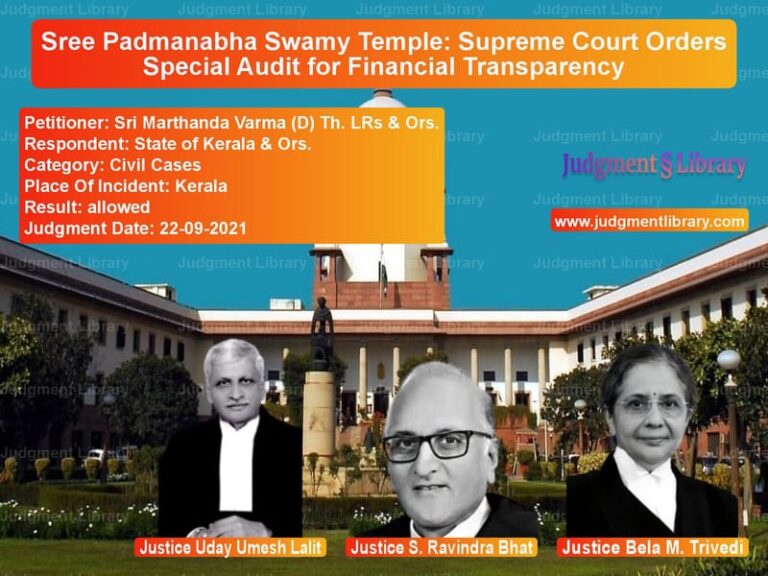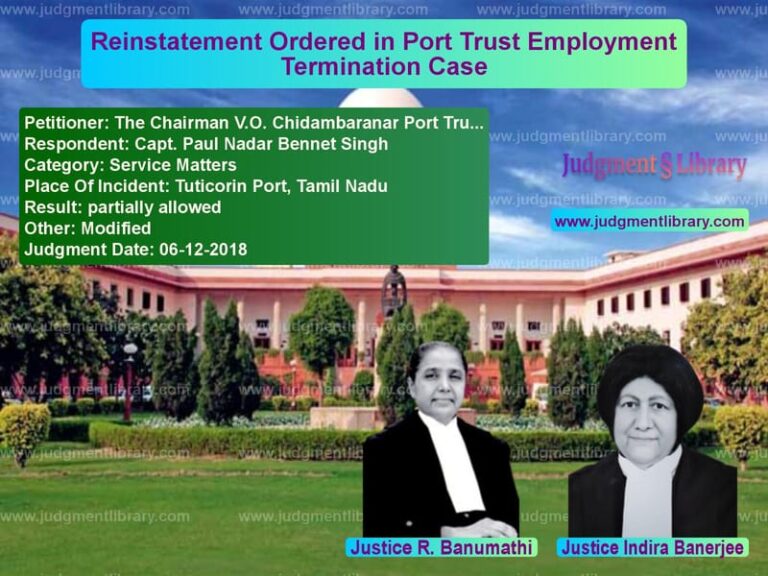Supreme Court Modifies Sentence in Kerala Liquor Possession Case Under Abkari Act
The Supreme Court of India recently ruled on a case involving the illegal possession of liquor under Kerala’s Abkari Act. The case, Sathyan v. State of Kerala, centered on the conviction of the appellant for carrying five liters of illicit arrack in his auto-rickshaw. The Court upheld the conviction but reduced the sentence, considering the excessive delay in trial and the long passage of time since the offense.
Background of the Case
The appellant, Sathyan, was arrested on October 1, 2003, for transporting five liters of arrack in a plastic jerry can. The prosecution argued that he was in violation of Section 8 of the Kerala Abkari Act, which prohibits the possession and sale of arrack.
The legal timeline of the case was as follows:
- October 1, 2003: Sathyan was arrested by excise officials.
- October 21, 2003: He was released on bail.
- April 17, 2006: The final report in the case was submitted, nearly three years later.
- November 3, 2008: The trial court convicted Sathyan under Section 8 of the Abkari Act, sentencing him to one year of imprisonment and a fine of ₹1,00,000.
- September 5, 2019: The Kerala High Court upheld the conviction.
- August 11, 2023: The Supreme Court modified the sentence, reducing the jail term to three months.
Key Legal Issues Considered
The Supreme Court analyzed the following legal questions:
- Whether the conviction of the appellant, based on the testimony of only official witnesses, was valid.
- Whether the three-year delay in filing the charge sheet compromised the fairness of the trial.
- Whether the interpolation in official records (Mahazar) impacted the validity of the evidence.
- Whether the sentence imposed was excessive given the time elapsed since the offense.
Arguments by the Appellant
The defense raised several objections to the conviction:
- The case was based entirely on the testimony of excise officials, with no independent witnesses.
- The final report was filed after an unexplained delay of nearly three years, which cast doubt on the prosecution’s case.
- There was a discrepancy in the Mahazar (seizure memo), where the sample quantity was altered from 375 ml to 180 ml.
- The accused had been out on bail since 2003, and after 20 years, sending him to jail for a year was excessive.
Arguments by the State
The State of Kerala defended the conviction:
- The testimonies of excise officials were credible, and there was no requirement for independent witnesses.
- The delay in filing the final report was procedural and did not affect the merits of the case.
- The correction in the Mahazar was minor and did not change the material evidence.
- The strict sentencing was necessary to deter the illegal liquor trade.
Supreme Court’s Analysis and Judgment
1. Validity of Conviction Based on Official Witnesses
The Court held that the testimony of official witnesses alone does not automatically invalidate a conviction:
“There is no bar on convictions being based solely on the testimony of police or excise officials. If their evidence is credible and trustworthy, the conviction can stand.”
2. Delay in Filing the Charge Sheet
The Court found the delay of three years concerning but not fatal:
“Inordinate delay can raise a presumption of prejudice, but the accused was out on bail, and no evidence was led to show actual prejudice.”
3. Interpolation in Mahazar
The Court dismissed the argument regarding the discrepancy in the sample volume:
“The correction in the Mahazar does not affect the integrity of the prosecution’s case, as the chemical examiner’s report confirmed the authenticity of the sample.”
4. Sentence Reduction
The Court acknowledged the excessive delay and the appellant’s long period of bail:
“Considering that the offense occurred in 2003, and over 20 years have passed, we find it appropriate to modify the sentence to three months of simple imprisonment.”
Supreme Court’s Final Decision
The Court partially allowed the appeal:
- The conviction was upheld.
- The jail sentence was reduced from one year to three months.
- The fine of ₹1,00,000 remained unchanged.
- The appellant was granted one year to deposit the fine.
- The order to surrender before the trial court was upheld.
Conclusion
The Supreme Court’s ruling establishes the following principles:
- Convictions based on official witnesses are valid if their testimony is reliable.
- Delays in investigation do not automatically vitiate a case unless the accused proves actual prejudice.
- Corrections in official records must be weighed carefully but do not always undermine prosecution cases.
- Sentences can be modified based on the time elapsed since the offense.
The judgment balances legal principles with fairness, ensuring that punishment is proportional to the circumstances of each case.
Petitioner Name: Sathyan.Respondent Name: State of Kerala.Judgment By: Justice Abhay S. Oka, Justice Sanjay Karol.Place Of Incident: Kozhikode, Kerala.Judgment Date: 11-08-2023.
Don’t miss out on the full details! Download the complete judgment in PDF format below and gain valuable insights instantly!
Download Judgment: sathyan-vs-state-of-kerala-supreme-court-of-india-judgment-dated-11-08-2023.pdf
Directly Download Judgment: Directly download this Judgment
See all petitions in Drug Possession Cases
See all petitions in Judgment by Abhay S. Oka
See all petitions in Judgment by Sanjay Karol
See all petitions in partially allowed
See all petitions in Modified
See all petitions in supreme court of India judgments August 2023
See all petitions in 2023 judgments
See all posts in Criminal Cases Category
See all allowed petitions in Criminal Cases Category
See all Dismissed petitions in Criminal Cases Category
See all partially allowed petitions in Criminal Cases Category







